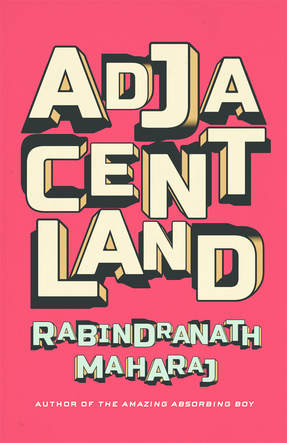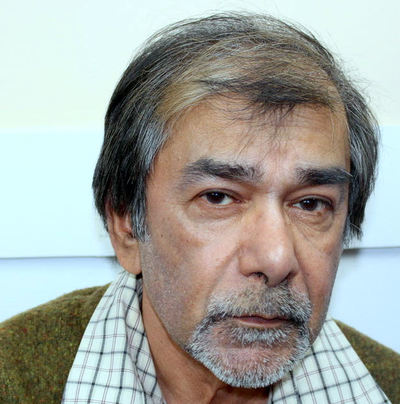SPECIAL FEATURE:
AN EXCERPT FROM
ADJACENTLAND
BY RABINDRANATH MAHARAJ
The Rusty Toque | Special Feature | Novel | May 12, 2018
Excerpt from Adjacentland
STAGE ONE
Chapter 1
The Unstable World Nine days ago, I awoke with a hum in my left ear that sounded like the steady strum of a bass guitar. I must have lain still for half an hour, fearfully watching the door and the jalousie, trying to establish some familiarity with my environment, passing my fingers along the two tiny bumps at the base of my skull, wondering at my situation. My neck and limbs felt as if I had been pressed into a tiny box. When I got up, I immediately fell to the floor and it was another half an hour before I was stable enough to fully appraise my surroundings. I noticed an unevenly stained closet stocked with clothes and a sum of money in the slim drawer of an escritoire with teeth marks on the right corner. Beneath the escritoire, I discovered two wicker baskets, one with an assortment of fountain pens, well-used pencils and some sort of boomerang-shaped bamboo totem nestling in a circle of incomplete illustrations and the other stacked with spiral notebooks and hard-bound sketchbooks with oilcloth covers. Between the books were three envelopes, each stuffed with onion-skin pages. When I first opened the envelopes, I saw that the pages were filled with scratchy charcoal drawings of men and women frozen in a moment of action or just standing with their arms folded over their muscular chests and gazing heroically at the silhouettes of devastated cities. On one of the sketches I saw the word Adjacentland. I cannot say if this is a real place and if, in fact, these illustrations are representative of actual cities. Nor have I been able to confirm their authenticity from the inked versions of these sketches, some of them framed, on each wall. Beneath every illustration was the same phrase: Today is a new day but yesterday was the same day. On one of the odder drawings situated above a locked cast-iron safe with a sturdy knuckle-shaped handle in the middle of a spiral of fingers, was the elaboration: Nothing exists until we deliver our verdict. This sketch, in watercolour, seemed out of place in that it depicted a scene that, on the surface, appeared serene and normal. A mother is holding a child in her arms. The child, a girl of around three or four, is frightened and the mother, well, her expression – and her gaze – changes from day to day. I have tried to understand what is so terrifying in the foreground but all I can see are fallen leaves that are so detailed I can count all the nested loops. Each day I have returned to the vaguely familiar patterns on the leaves before I turn to the scribbles at the bottom of the sketches. So far, I have been able to distinguish just one; this, attached to a watercolour painting of a child, her back turned, gazing at the air. At either side of the drawing, which seems to be cropped, are two pairs of feet and beneath, a scribbled line that is also cut off: The child – I will add here that although there is some familiarity about the drawings and their subjects, I can feel no real connection with either. Nor, initially, with the clutch of letters I discovered hidden in a jacket hanging in the closet. They all instruct me to record my impressions and “my range of emotions” but there was one that described a relationship characterized by manipulation, bullying, jealousy and, not surprisingly, betrayal. The tenuous relationship, I worked out, was between a writer and an artist. It took a full week before I worked out the identity of the artist and that of the writer and decided to record what I have learned. This may sound desperate but a man with little to remember is forced to remember everything. But you, my friend, already know all of this. Are you disappointed that I am, here, referring to you? If so, you will be even more distraught to know that I have determined – from your manner of evoking accusations in an abstract and indirect way – that you are secretive and sly. Here is this sentence from one of your letters, for instance: “Once we shared the same thoughts and beliefs, complimented each other’s views, made fractions whole but all of that was ripped in half. We each went our separate ways, walking away from ourselves, never looking back.” In another letter, torn into six pieces and scattered within the inner lining of my jacket were these cryptic instructions. “Look to the drawings. I have disguised my writing and it is my hope that by the time you determine my identity you would have understood enough to forgive me. We are the only ones left. Trust no one. Least of all yourself.” I have gone over that last injunction several times, trying to understand your meaning. Did you leave me here? Will you soon return and explain everything, elongating my recollections beyond the nine days since I have found myself in this place; beyond my only memory of the unstable world outside? Or maybe it’s the memory that is unstable. I am in a single-carriage train. Or perhaps it’s a bus with a high, sloping roof, I can’t be certain. In this reconstruction, I am gazing through the oval window of the vehicle. The clouds are lower than usual, forming a latticed ceiling that resembles a drooping cobweb. I feel I can touch it if I stick my hand outside. The vehicle comes upon a row of derelict buildings – theatres, casinos and an abattoir – with billboards turned the wrong way. A flock of iridescent birds with scabbed wings have perched on all the eaves and they seem to follow us into the night, which falls suddenly. The moonlit night sky is a mellow greyish-brown and this tint, repeated in the fields beneath, makes it look as if the melting sky is rippling downwards. We pass a child standing alone and when she shrinks from the vehicle I hear a shuffling behind me and realize there is another passenger. Now there is a town ahead. In the front yards of the stuccoed mansions are alabaster statues haloed with rings of dull light. The hands of the figures are raised to the sky and from the bus, the scene looks like a conjuration of frozen ghosts. There is an odd intimacy to the positions of the statues and I think of a city destroyed so swiftly its residents were preserved in their last acts. The trees seem to be afflicted with an infestation that renders the leaves cottony and pale. In the distance, the headlights illuminate a black speck. We get closer and I see it is a child, dressed in dark green, standing alone. She is holding a bow-shaped toy with which she swings as if to strike the vehicle. I hear a low, melodious chuckle at the back that eases into words I only decipher as we enter a tunnel, its sides glistening like freshly cut tissue. “Let it be known, brethren, that the unknown is simply a place not yet visited.” The walls of the tunnel seem to be closing in. The other passenger does not appear concerned. I hear him singing, “You cannot hide it any longer. We know what you have and we shall pluck it out one fibre at a time. And yea, we shall hold it up to the morning light and when a newborn witnesses it, mysteries shall live and die in the span of a single tingle. You have brought this upon yourself, brethren. You have taken the fire with you and there’s no stopping it now. A great turbulence is before us.” The voice gets closer and I am seized with panic. “They know what they are searching for but cannot recognize it. Advantage yours.” I have used the word reconstruction because this retrieval has the quality of a vivid dream. I am recording all of this with the hope that, as I write, I will eventually come to some greater understanding of the man I once was and will understand my condition not from disconnected episodes, but will grasp eventually a complete life. Perhaps this is what everyone wants at the end. A quiet understanding. But there are more immediate concerns. |

Adjacentland
by Rabindranath Maharaj
Wolsak and Wynn, 2018
Description from Wolsak and Wynn
In this disquieting new work from award-winning novelist Rabindranath Maharaj,
a man awakens in a strange institution called the Compound with no memory of his past. Struggling to make sense of his surroundings, he is skeptical of the administrators who try to convince him he is mad and dangerous, and suspects he has been the subject of recurring experiments, which have caused episodes of amnesia. In dreamlike prose Maharaj weaves a story of fragments, where our narrator comes to believe that he was once a comic book writer who warned that the reliance on artificial intelligence would make the imagination obsolete and subversive. As the narrator searches for clues he may have left for himself before his memory loss, both he and the reader learn of Adjacentland, a primitive land of misfits and outsiders. It is only in Adjacentland that the imagination has survived. With a motley group of inmates from the Compound, the narrator decides to make his way there, but during the journey he discovers a terrible secret about himself and his companions.
by Rabindranath Maharaj
Wolsak and Wynn, 2018
Description from Wolsak and Wynn
In this disquieting new work from award-winning novelist Rabindranath Maharaj,
a man awakens in a strange institution called the Compound with no memory of his past. Struggling to make sense of his surroundings, he is skeptical of the administrators who try to convince him he is mad and dangerous, and suspects he has been the subject of recurring experiments, which have caused episodes of amnesia. In dreamlike prose Maharaj weaves a story of fragments, where our narrator comes to believe that he was once a comic book writer who warned that the reliance on artificial intelligence would make the imagination obsolete and subversive. As the narrator searches for clues he may have left for himself before his memory loss, both he and the reader learn of Adjacentland, a primitive land of misfits and outsiders. It is only in Adjacentland that the imagination has survived. With a motley group of inmates from the Compound, the narrator decides to make his way there, but during the journey he discovers a terrible secret about himself and his companions.
RABINDRANATH MAHARAJ is the award-winning author of three short story collections and five novels, including The Amazing Absorbing Boy, which won the 2010 Trillium Book Award and the 2011 Toronto Book Award, and was voted a CBC Canada Reads Top 10 for Ontario. In 2012, Maharaj received a Lifetime Literary Award, administered by the National Library and Information System Authority as part of the commemoration of Trinidad’s fiftieth independence anniversary. In 2013, he was awarded the Queen Elizabeth II Diamond Jubilee Medal, which honours significant contributions and achievements by Canadians.


